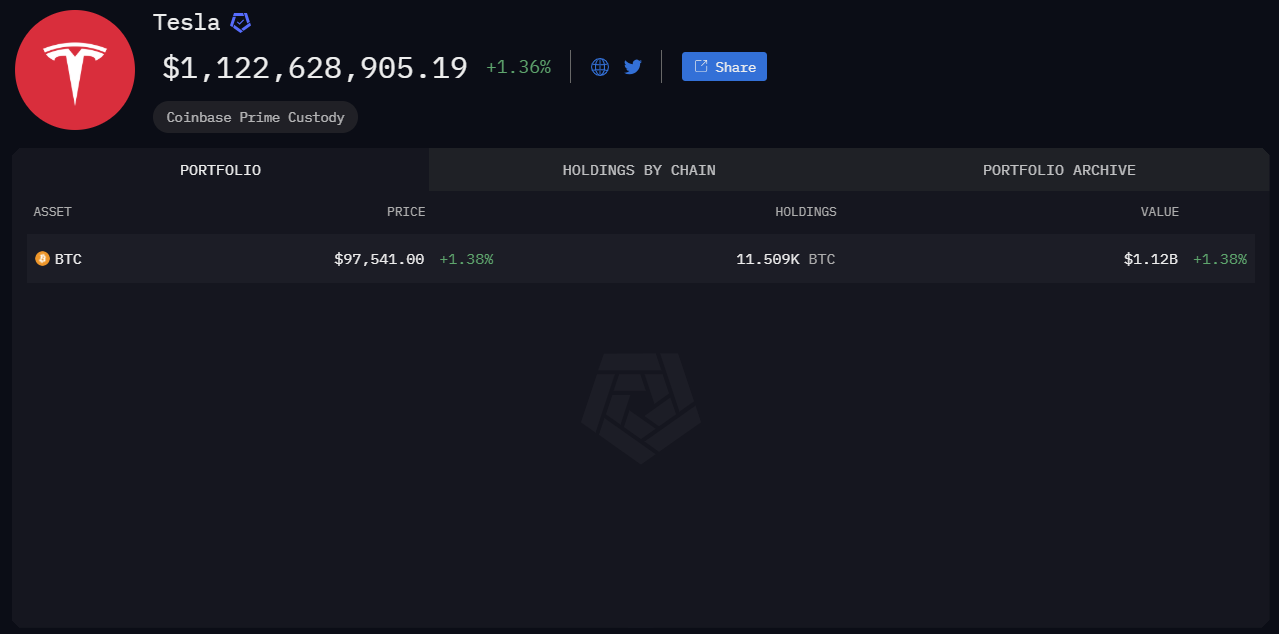Tesla has reported a $600 million profit from its 11,509 Bitcoin in Q4, according to a new Securities and Exchange Commission (SEC) filing.
The disclosure is Tesla’s first under the new Financial Accounting Standards Board (FASB) rules, implemented in December 2024, that allows firms to list digital assets at fair market value instead of their historical price.
“Under the new guidelines, digital assets can be marked to market, accurately reflecting fair value and dispelling the notion that Bitcoin is a ‘dead asset’ on the books,” explained Gadi Chait, investment manager at Xapo Bank.
Tesla purchased 39,474 BTC in early 2021, valued at $1.5 billion with an average price of $38,000 per coin. 70% of its holdings were sold in 2022. Its 11,509 BTC, is now valued at $1.1 billion at Bitcoin’s current price of $97,000, according to Arkham Intelligence.

FASB’s new rules benefit corporate Bitcoin treasuries, allowing them to borrow against their holdings.
“Essentially, fair accounting rules enable Bitcoin to be treated as an asset in a manner that reflects its market value at any given time. The transparency and predictability of this make it far easier for corporations to hold Bitcoin on their balance sheets,” John Glover, chief investment officer of Ledn explained.
“Rather than selling Bitcoin and triggering taxable events, companies can borrow against their holdings to access working capital while maintaining their Bitcoin position. This allows companies to maintain their exposure to Bitcoin’s appreciation while accessing immediate liquidity to invest in stocks, bonds or other financial instruments to generate returns on reserves.”
These rules aren’t the only accounting policy shifts that are favourable to the crypto industry. In late January, the SEC rescinded a notorious accounting rule that drastically impacted how cryptocurrency is recognised.
SEC Axes Crypto Accounting Rule SAB 121
The SEC rescinds crypto rule SAB 121, easing burdens on financial firms. The move follows Biden’s veto and Congress’s failed override

Known as Staff Accounting Bulletin (SAB) No. 121, the rule requires companies to list crypto assets on their balance sheets, increasing the expense for financial institutions to deal with cryptocurrencies.
Meanwhile, Tesla CEO, Elon Musk, has been busy leading Donald Trump’s Department of Government Efficiency (DOGE). Last month, the department held discussions about incorporating blockchain technology.
Musk suggested using blockchain to reduce costs, streamline processes, and enhance transparency across government functions.
Elon Musk’s DOGE Explores Blockchain Technology
Elon Musk’s DOGE explores blockchain to cut costs, boost transparency, and secure data, potentially marking a major shift in US government tech use





